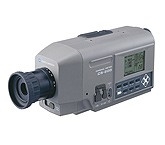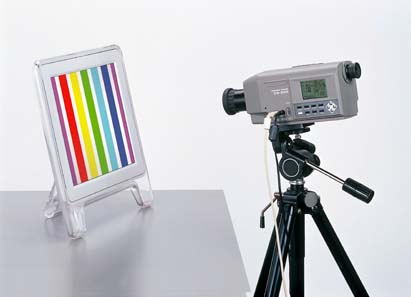 |
CS-200 Luminance & Color Meters
Brand: KONICA MINOLTA
Made in Japan

CS-200 is an instrument that enables highly accurate luminance and chromaticity measurements, comparable to those of the spectroscopic type of instrument while maintaining the simplicity, operability, and competitive price of the tristimulus type.
The CS-200 features 40 sensors and performs calculations using the spectral sensitivity characteristics (colour-matching functions) corresponding to the sensitivity of human eye. With this newly developed spectral fitting method, tristimulus values (XYZ for red, green, and blue) with a far higher accuracy than those of conventional tristimulus colorimeters can be obtained, providing excellent accuracy.
Measurements over a wide range of luminance levels from a low luminance of 0.01 cd/m2 through high luminance of 20,000,000cd/m2 (with measuring angle of 0.1°) can be done.
Three measuring angles can be selected: 1°, 0.2°, and 0.1°. The measuring angle can be switched according to the measurement target, ranging from display devices or other objects with large areas to measure through objects with tiny areas to measure, such as car audio control panels, vehicle instrument panels, and compact LCDs.
Light sources of all types can be measured with the CS-200, for example signal, traffic lights, airport lighting, lamps, LEDs, picture tubes, LCDs, PDPs, etc., simply anything that emits light. With the ever-growing demand for diversified media stimulated by the growth of information-technology business and full-scale service of digital broadcasting, research and development have been accelerated for various display devices, centering on plasma displays and LCDs. Innovations in LED technology have led to remarkable breakthroughs in the development of LED products including traffic lights, backlights for reflective LCDs, and large outdoor display screens.
There are two ways of determining luminance and chromaticity values for a light source.
A tristimulus type of instrument measures light sources with three sensors (red, green, blue) that have sensitivity similar to the sensitivity of human eyes to light. The filters used to reach this sensitivity have a limit in precision and thus the readings of tristimulus instruments can not be perfect on all kind of light sources. Best accuracy is reached when measuring light sources with a similar spectral distribution like that of the light source used for calibration of the instrument.
The second method, which is used by the CS-200, is to measure the spectral emittance of the light source and perform calculations using the spectral sensitivity characteristics (color-matching functions) corresponding to the sensitivity of human eye. By this method, the mis-matching of filters is avoided and thus the measurement results are much more precise.
The new Auto Mode adjusts the measurement speed according to the luminance of the measurement subject. Particularly for low luminances, it may not be possible to obtain the necessary accuracy at some measurement speeds. The new Auto Mode will automatically select the optimum measurement speed to provide the utmost performance from the CS-200 and enable high measurement accuracy to be more easily obtained.
The CS-200 can be used for luminance and chromaticity measurement of various optical devices such as displays like LCDs, PDPs, organic ELs and FEDs, as well as light sources such as LEDs and lamps.
Measurements can be synchronized with the display device by numerical input of the frequency. Selectable measurement speed (AUTO, LTD. AUTO, MANU, superFAST, FAST, SLOW and superSLOW) Large LCD display with backlight USB 1.1 communication
Data storage: 101 measured values (9-letter ID assignment possible) and 20 reference values
User calibration: 20 channels
| Model | CS-200 |
|---|---|
| Measurement range | 0.01 - 200,000 cd/m2 (Measuring angle 1°) 0.01 - 5,000,000 cd/m2 (Measuring angle 0.2°) 0.01 - 20,000,000 cd/m2 (Measuring angle 0.1°) |
| Accuracy (Measuring angle 1°) #1 (Temperature: 23°C±2°C, Relative humidity: 65% max.) | 150 cd/m2 ( for Illuminant A ) : Lv ±2 % ±1digit ; xy ±0.002 0.01-0.5 cd/m2 ( for Illuminant A ) : Lv ±0.02cd/m2 ±1digit ; --- 0.5-1 cd/m2 ( for Illuminant A ) : Lv ±0.02 cd/m2 ±1digit ; xy ±0.007 1-10 cd/m2 ( for Illuminant A ) : Lv ±2 % ±1digit ; xy ±0.004 10-200,000 cd/m2 ( for Illuminant A) : Lv ±2 % ±1digit ; xy ±0.003 5000 cd/m2 ( for Illuminant A ) : color filter (R, G, B) ; xy ±0.006 |
| Repeatability (Measuring angle 1°) #2 | 0.01-1 cd/m2 ( for Illuminant A ) : Lv ±0.01 cd/m2 ±1digit ; --- (2σ/AUTO) 1-2 cd/m2 ( for Illuminant A ) : Lv ±0.5 % ±1digit ; xy 0.002 (2σ/AUTO) 2-4 cd/m2 ( for Illuminant A ) : Lv ±0.5 % ±1digit ; xy 0.001 (2σ/AUTO) 4-8 cd/m2 ( for Illuminant A ) : Lv ±0.5 % ±1digit ; xy 0.0005 (2σ/AUTO) 8-200,000 cd/m2 ( for Illuminant A ) : Lv ±0.1% ±1digit ; xy 0.0004 (2σ/AUTO) |
| Measurement time | Automatic setting between 1s and 60s (AUTO); Automatic setting to 1s or 3s (LTD. AUTO) 0.5 sec / meas. (Super-FAST) 1 sec / meas.(FAST)3 sec / meas. (SLOW) 12 sec / meas. (Super-SLOW) |
| Measurement method | Spectral method, Grating + linear photo diode array |
| Measuring angle | 1°, 0.2°, 0.1°(switchable) |
| Minimum measuring area | 0.5 mm 0.1 mm (close up lens) |
| Minimum measuring distance | 296 mm (Distance from front edge of metal lens barrel) |
| Observer | 2/10 degrees |
| Color space | Lv x y, Lv u' v', Lv TΔuv, XYZ, dominant wavelength |
| Measurement synchronization setting range | Vertical synchronization frequency : 40.00 to 200.00Hz |
| Interface | USB 1.1 |
| Power source | AC adapter or 4 AA-Size Batteries |
| Battery life | Approx. 3 hours (continuous measurement / Fast mode / AA-size alkaline cells) |
| Size | 95 mm (W) × 127 mm (H) × 330 mm (L) |
| Weight | 1.8 kg (without battery) |
| Operating temperature/humidity range | 0°C to 40°C, relative humidity 85% or less (at 35°C) with no condensation |
| Storage temperature /humidity range | 0°Cto 45°C,relative humidity 85% or less (at 35°C)with no condensation |
| #1 | 23°C±2C Lv = 0.01-10 cd/m2, SLOW, average of 30 measurements Lv = 10 cd/m2 and higher, SLOW, average of 10 measurements |
|---|---|
| #2 | At 0.2°measuring angle, the amount of received light is approx. 1/25 of that for 1°. Therefore, the repeatability becomes the same as that for 1°with 25 times lower luminance. At 0.1°measuring angle, the amount of received light is approx. 1/100 of that for 1°. Therefore, the repeatability becomes the same as that for 1°with 100 times lower luminance. |
| * | Specifications are subject to change without notice. |
About Us Contact Us Focus on Color Global Agents Site Map
Link:colorimeter Color Assessment Cabinets pecolor iQstest spectrophotometer
© 1998~2025 ColorController, Incorporated. All Rights Reserved.